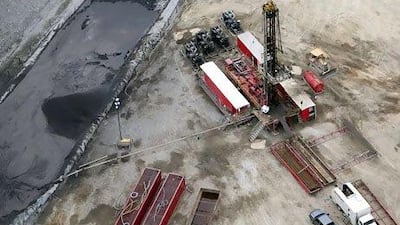Surging shale oil production will cost Opec market share next year and push global crude supply beyond demand, predicts the International Energy Agency (IEA).
The IEA's assessment comes a day after Opec, for the first time, acknowledged the threat of shale oil to its market position.
Boosted by North American output, incremental production from non-Opec countries will reach 1.3 million barrels per day (bpd) next year, the IEA said in its monthly oil market report yesterday.
In spite of an improved economic outlook, global demand for crude will increase only by 1.2 million bpd, according to the agency.
Demand for Opec crude will decline by 200,000 bpd to 29.4 million bpd.
"Non-Opec supply growth looks on track to hit a 20-year record next year," said the IEA. "As a result, the 'Call on Opec plus Stock Changes' is set to edge down in 2014."
On Wednesday, Opec for the first time conceded that shale oil is starting to change the dynamics of the oil markets. In its monthly report, it forecast that next year non-Opec oil will displace 300,000 bpd of crude from the organisation's members in the market.
Oil production in North America is boosted by hydraulic fracturing, or fracking, a technique that dislodges oil and gas trapped in deep-lying shale rock formation. Fracking has already transformed the US gas sector, and is driving the revival of the country's oil production.
According to the IEA, 800,000 bpd of next year's additional supply from outside Opec will come from North America.
The agency believes that the US will overtake Saudi Arabia as the largest producer of crude within five years.
Opec's position in the market is also challenged by the political volatility that continues to affect the Middle East and North Africa in the aftermath of the Arab Spring.
In June, Opec production fell by 370,000 bpd over supply disruptions in Iraq, Libya and Nigeria.
"Above-ground disruptions in the Mena region already have provided a major offset to rising North American supply, and may continue to do so," said the report.
If it continues to grow strongly, North American shale production will provide a buffer from the political risk in the Middle East and North Africa, analysts say, as it will allow Saudi Arabia to curb its output, increasing the idle production capacity it can put back into operation at short notice. "When Saudi Arabia cuts back there will be more spare capacity and the market will be more at ease about regional instability," said Robin Mills, the head of consulting at Manaar Energy.
US and Canadian oil production will grow by nearly 4 million bpd in the five years up to 2018, projects the IEA, equal to almost two thirds of non-Opec supply increases in that period.
If Opec's share of the global market continues to decline, it will exacerbate tensions between Saudi Arabia and Iraq. The latter plans to ramp up production strongly in the coming years, meaning that Opec's voluntary production ceiling will be maintained only by reduced Saudi Arabian output.
If the organisation cannot agree on a ceiling, the resulting increase in exports will reduce the price fetched for its oil.
Global supplies fell by 290,000 bpd last month, said the IEA, as rising non-Opec production failed to absorb declines in the Middle East and Africa.

